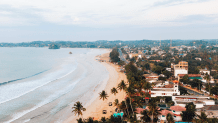San Francisco newlyweds John and Michelle Senyard are in the midst of an unforgettable honeymoon, just not the one they had been dreaming about. Limited flight options amid the coronavirus pandemic have left them stranded in Sri Lanka, unaware of when they might be able to return home.
Their planned adventure to Thailand and Sri Lanka, complete with world-class surf beaches and a safari, has now become an unusual and prolonged endurance test for the newly married couple.
We're actually calling it a 'supermoon' now
Michelle Senyard, newlywed now stranded in Sri Lanka
“We're actually calling it a ‘supermoon now,” jokes Michelle, who was supposed to fly back home to San Francisco with her husband three weeks ago. “It’s definitely been a rollercoaster.”

Couple's Return Flight Home Cancelled
John and Michelle were already well into their honeymoon by the time San Francisco and five other Bay Area counties enacted their stay-at-home orders in an effort to halt the spread of COVID-19. The couple got married in Southern California on March 6. Two days later, they traveled to Thailand for the first stretch of their vacation. They then flew to Sri Lanka on March 16. It wasn't until the next day when six Bay Area counties enacted those stay-at-home orders.
Two days after landing in Sri Lanka, John and Michelle learned their plane tickets home to San Francisco had been cancelled. The Sri Lankan government has since began imposing irregular curfews that can last for days. People are only allowed to leave their homes for a few hours at a time, leading to incredibly long lines at area shops. Simply buying groceries can now be a full-day ordeal.
“There have been a lot of times where John has had to hold me and say, ‘hey, we're gonna be okay.’ And I don't totally believe him, but I kind of have to because I have no other choice," said Michelle. “I only have one person in this entire country that I can really lean on,” she said, looking at her new husband.
15,000 Americans Stranded Abroad in Midst of Pandemic
Tightened borders and cancelled flights around the world have left about 15,000 Americans stranded on work trips, university programs, vacations, and even honeymoons.
The number of flights in and out of San Francisco International airport is down at least 95%. Worldwide, there are about 64% fewer flights in the air, according to OAG Aviation Worldwide.
The U.S. State Department announced it has helped more than 61,000 people return home from remote locations all over the globe, from destinations like Nepal, Guatemala, Peru, Ecuador and Argentina.
“I want the American people to have a better sense of the staggering logistical coordination and detail that goes into every one of these repatriation operations,” said Secretary of State Mike Pompeo during a briefing last week. “In Argentina, our people worked with foreign ministry contacts, helped American missionaries pass through armed checkpoints,” he said, adding that with the help of the U.S. military and Homeland Security, his teams had helped a group of tourists evacuate from near Mt. Everest in Nepal, and assisted a pregnant woman and her husband get back to the U.S. “in a timely manner.”
Stuck Abroad? Register with U.S. State Dept. to Get Travel Updates
For those stuck abroad, the U.S. State Department recommends registering with the agency’s Smart Traveler Enrollment Program (STEP), which provides Americans with the latest information on travel restrictions and availability in their specific area abroad.

Couple Unsure When They'll Be Able to Return Home
John and Michelle recently found a flight that could get them back home, but they worry that option may be riskier than staying where they are.
“We're looking at over 45 hours of travel,” said John, adding that they would be sleeping in airports and have “layovers through some of the worst coronavirus infected cities, and I think our immune systems would just be crushed after all that.”
“I historically get sick every single time after traveling long hours,” said Michelle. “And so I think that's what really made our final decision, was that in terms of our health, we would definitely be more at risk,” she said.
While they wait, John and Michelle have managed to return to their jobs - remotely. John, an account executive, and Michelle, a social media manager, both work for San Francisco-based tech companies, but while sheltering in Sri Lanka they are currently 12.5 hours ahead of their teams back in California.
“We're basically starting our workday at 6 p.m. and then ending our work night at 2 a.m., our time,” said Michelle. “It's definitely been a weird feeling.”

Coronavirus Curfew in Sri Lanka
On days when the curfew is lifted, the couple often wakes up around 5 a.m. to make their way around town and gather whatever food and supplies they may need for the next few days. Determining when the curfews begin and end, however, isn’t always easy.
“There's a ton of fake curfew news,” said Michelle. To separate fact from fiction, they go on line. “They actually have a local app that goes through all the news sources and verifies the real ones and then puts the rest in a fake news column,” John explained.
“We stood...almost six hours in really brutal heat and had to visit several different locations,” said Michelle, about their last trip out to buy groceries. “After all of that, we came back to our hostel and then washed, cooked, cleaned and then right went right into our work schedule.”
“Go to sleep, then rinse, and repeat,” said John. The couple relies heavily on instant coffee -- the only caffeine available.
One of the toughest things for us has just been that literally everything is different here.
John Senyard
“For most people, the new normal includes a lot of things that were part of your past...the grocery store, it's the same store, it's the same food. You see the same neighbors...and I think emotionally, one of the toughest things for us has just been that literally everything is different here,” said John.

Stranded Travelers Turn to Private Companies for Travel Help
Others stranded abroad in the midst of this pandemic have turned to private companies for help in getting back home. Firms can charge anywhere from a few hundred dollars to upwards of tens of thousands of dollars for their travel services.
“In many cases, the first thing we need to do when working with folks is find out, ‘are they safe,’ and then find out what they want to do,” said Bill McIntyre, Communications Director for Global Rescue, a New Hampshire company that employs former Green Berets and Navy SEALs to extract people from natural disasters, terror attacks, and civil wars. McIntyre said calls for help have doubled during the COVID-19 outbreak, but the challenges have also ramped up.
“We can typically do charters,” said McIntyre, “but right now we can’t get landing permits, so we have to rely on what we call ‘bureaucratic fluency’ - our connections in government, embassies...and the experience of our people on the ground.”
Harding Bush, a former Navy SEAL and director of operations for Global Rescue, said Americans stranded abroad often feel “very isolated, they have a lot of anxiety, they’re frustrated.”
In one recent operation, Bush’s team helped Olympic snowboarder Kaitlyn Farrington and her group escape from Hemu Village, in northwestern China, just as coronavirus lockdowns were sweeping the country. The skiers were facing a possible 20-day quarantine if they didn’t get out fast. With the help of a Chinese policeman - and a snow plow, the team made it out of town and safely onto the last United Airlines flight leaving Chengdu, China - some 700 miles away.
This is kind of like my mom's biggest ‘I told you so moments’
Michelle Senyard, on her decision to travel abroad for their honeymoon

Back in Sri Lanka, John and Michelle aren’t planning any daring getaways - yet. They pass the time cooking, working remotely, and making funny videos for family and friends back home.
“This is kind of like my mom's biggest ‘I told you so moments’ I would say in her entire career as my mother,” said Michelle, who added that family and friends at their wedding tried to persuade them not to travel. “This is definitely not what we anticipated at all,” said Michelle.
Being able to be here...has been quite the adventure and I'm choosing be grateful for it.
Michelle Senyard
The couple’s original airline has rebooked them on a flight home to San Francisco on May 2, but John and Michelle worry that flight will inevitably be cancelled just like their first flight. For the foreseeable future, the newlyweds plan to make the best of their time abroad, spending many hours working together and entertaining one another while sheltering in a tiny hostel on a small island more than 9,000 miles from home.
“This is definitely the longest time that we've ever spent together,” said Michelle.
“Like a 100% together all the time,” said John.
“Being able to be here...has been quite the adventure and I'm choosing to be grateful for it,” said Michelle. “We're really learning how to be partners.”



